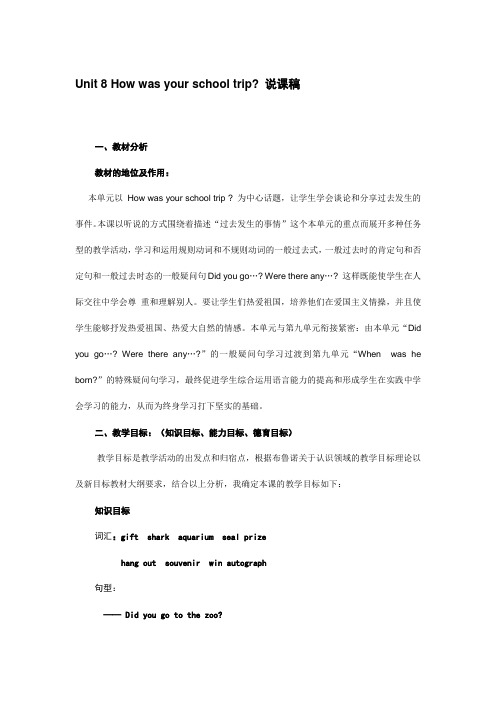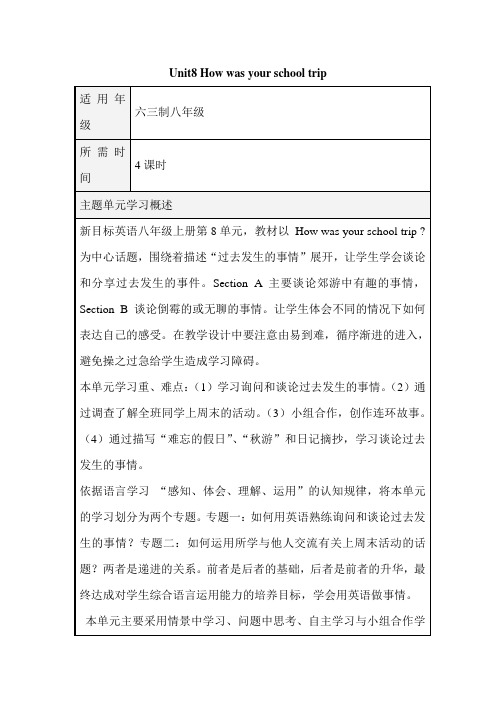Unit 8 How was your school trip(Section B 2a-selfcheck)
- 格式:ppt
- 大小:2.58 MB
- 文档页数:11


Unit 8 How was your school trip?Topic: School tripsFunctions: Learn to talk about events in the pastLearn to ask and answer what happened in the pastLearn to describe things happened in the pastTarget language: What did you do on your school trip?Did you go to the zoo?No, I didn’t. I went to the aquarium.What did you see?Were there any sharks?No, there weren’t any sharks, but there were some really smart seals.Where did you go?I went swimming.The weather was beautiful.Teaching StepsPeriod 1Lead in:Hello, everybody! Today we are going to learn Unit 8 “How was your school trip?” Do you remember your last school trip? Where did you go last year? Was that great? First, let’s look at the language goals.Step 1: Section A 1a1.Ask and answer.What did you do on your last school trip? Did you go to the beach? Did you have ice cream? Were you happy?2.Make a list.Write what you did in 1a.3.Say out the answers.Who’d like to tell us your answers?Step 2: Section A 1b1.Learn the words.O n Tina’s last school trip, she went to the aquarium. Now let’s see the animals in it. Look at this picture. What’s this? Yes, it’s a dolphin.What’s this? Yes, it’s a starfish.What’s this? Yes, it’s a seal.What’s this? Yes, it’s a seahorse.What’s this? Yes, it’s a shark.What’s this? Yes, it’s an octopus.Look at these. What’re these? Yes, they’re souvenirs.What’re these? Yes, they’re autographs.2.Read the expressions.Look at the expressions in the box and read after me.3.Translate the expressions.Do you know their meanings? Please translate them.4.Listen and circle.Now let’s listen to a conversation and try to finish 1b.5.Check the answers.Shall we check the answers now? OK, please look at the PPT.6.Read the dialogue.Read the dialogue in the picture together.7.Recite.I’ll give you two minutes to recite the sentences in the picture. Finished? Let’s recite together.Step 3: Section A 1c1.Practice the conversation.Work in pairs and ask what Tina did on her school trip, using the expressions in the box.Language tips:A: Did Tina ...?B: Yes, she did. She ... / No, she didn’t. She / Her friend ...Example:A: Did Tina go to the aquarium?B: Yes, she did. She went to the aquarium.A: Did Tina buy a souvenir?B: No, she didn’t. Her friend Grace bought a souvenir.2.Make conversations.Watch the PPT and ask and answer the questions below.Did you go to see the movies?Were there many people in the cinema?Did your mother cook dinner yesterday evening?Did you do your homework last weekend?Did you clean your bedroom yesterday?Did you have a shower before you went to bed?Were there any students in our classroom ten minutes ago?3.Act out.Who’d like to act out your conversations?Step 4: Section A Grammar复习:一般过去时在英语中,当我们要描述过去发生的动作时,要使用一般过去时。

Unit 8 How was your school trip? 说课稿一、教材分析教材的地位及作用:本单元以How was your school trip ? 为中心话题,让学生学会谈论和分享过去发生的事件。
本课以听说的方式围绕着描述“过去发生的事情”这个本单元的重点而展开多种任务型的教学活动,学习和运用规则动词和不规则动词的一般过去式,一般过去时的肯定句和否定句和一般过去时态的一般疑问句Did you go…? Were there any…? 这样既能使学生在人际交往中学会尊重和理解别人。
要让学生们热爱祖国,培养他们在爱国主义情操,并且使学生能够抒发热爱祖国、热爱大自然的情感。
本单元与第九单元衔接紧密:由本单元“Did you go…? Were there any…?”的一般疑问句学习过渡到第九单元“When was he born?”的特殊疑问句学习,最终促进学生综合运用语言能力的提高和形成学生在实践中学会学习的能力,从而为终身学习打下坚实的基础。
二、教学目标:(知识目标、能力目标、德育目标)教学目标是教学活动的出发点和归宿点,根据布鲁诺关于认识领域的教学目标理论以及新目标教材大纲要求,结合以上分析,我确定本课的教学目标如下:知识目标词汇:gift shark aquarium seal prizehang out souvenir win autograph句型:—— Did you go to the zoo?—— Yes, I did./No, I didn’t. I went to the aquarium.—— Were there any sharks?—— Yes, there were./No, there weren’t any sharks.能力目标:培养学生用英语思维的判辨能力、综合运用语言的能力和自主学习的能力。
培养学生的语言交际能力和创新能力。
德育目标:使学生在人际交往中学会尊重和理解别人。

unit8《howwasyourschooltrip》知识讲解及练习含答案(人教新目标初二上)doc初中英语【单元话题】1. 会谈论过去的情况2.培养自己做事要有打算性3.培养逻辑思维能力4.培养合作意识【重要句型概览】1. What did you do on your school trip?2. Did you go to the zoo?No, I didn’t. I went to the aquarium.3. Were there any sharks?No, there weren’t any sharks, but there were.【重要词组概览】go to the aquariums去水族馆take photos照相,拍照hang out with sb.和某人闲逛win a prize获奖〔金〕have a great time玩得快乐take the bus back to school乘公共汽车回学校lots of=a lot of许多,大量at the end of在……的尽头go for a drive开车兜风help sb. do sth.关心某人做某事help sb. with sth.在某方面关心某人thanks for doing sth.感谢某人做了某事day off休假【语法知识聚焦】一样过去时:表示过去曾经发生的动作或显现的状态,以动词的过去式表达,如:I was at the library yesterday afternoon.Tom studied hard and did well in the final exam last year.动词的过去式分为规那么动词和不规那么动词两种。
1. 规那么动词只要在动词词尾加上ed即可。
具体方法是一样情形直截了当加,如:clean—cleaned;2. 词尾是不发音字母e的,可只加上d,如:like—liked;3. 词尾为重读闭音节,结尾只有一个辅音字母的,应双写该辅音字母,再加上ed,如:stop—stopped;4. 词尾为辅音字母加y的,应将y改为i再加上ed,如:study studie5. 不规那么动词有其自己的变化形式,只能分不经历。

初二英语Unit 8 How was your school trip? 人教版(新目标)【本讲教育信息】一. 教学内容:Unit 8 How was your school trip?一. 单元目标:1. 学习询问和谈论过去发生的事情。
2. 通过调查了解全班同学上周末的活动。
3. 通过描写“难忘的假日”,“秋游…”和日记摘抄,学习谈论过去发生的事情。
二. 语言结构:1. 规则动词和不规则动词的一般过去式。
2. 一般过去时的肯定句和否定句。
3. Did you, Were there引导的一般疑问句。
三. 重点词汇:1. aquarium n. 水族馆2. science center科学中心3. gift shop礼品商店4. seal n. 海豹5. shark n. 鲨鱼6. octopus n. 章鱼7. autograph n. 亲笔签名8. win v. 获胜,赢9. ate v. (eat的过去式)吃10. took v. (take的过去式)乘坐、花费11. hung out (hang out)外出12. got v. (get的过去式)得到13. go for a drive开车兜风14. sleep late 睡得晚15. yard sale 现场旧货出售16. day off 放假四. 重点短语:1. take photos 照相2. at the aquarium 在水族馆3. win a prize 获得奖品4. on the school trip 在学校旅行5. have a great time 玩得愉快6. watch a dolphin show 看一场海豚表演7. after that 那以后8. at the end of …在…结束在…末尾9. on the day off 在假日里10. all day 一整天11. e back from…在…回来五. 重难点解析:1. 复习一般过去时一般过去时态是谈论过去最常用的时态,它可以表示短暂而很快就完的动作和事情,时间较长的动作和状况以及重复发生的事情,句中通常有明确的一般过去时的时间状语。

Unit8Howwasyourschooltrip?教案i. 课前分析:本单元主要围绕学校郊游这一话题,让学生大量练习过去式的用法。
section a主要谈论郊游中有趣的事情, section b 谈论倒霉的或无聊的事情。
让学生体会不同的情况下如何表达自己的感受。
在中要注意由易到难,循序渐进的进入,避免操之过急给学生造成学习障碍。
ii. 学情分析:学生在进行活动中很可能会出现没话说,或说不出来的的情况。
如在进行自主对话或讨论的时候,不能找到合适的话题。
iii. 解决方法:在讲课的过程中,注意培养学生的发散思维与创新意识,鼓励他们好的想法,注重一些活动的累积。
iv. teaching aims:1. knowledge target:a. inspire the students to enlarge their visual field about all kinds of activities.b. encourage students to talk about events in the past freely and happily.2. ability target:a. help the students to improve the abilities of listening, speaking, reading and writing, especially listening and speaking.b. make the students have a further impression of simple past form.moral target:a. inspire the english--learning beginners to learn the language step by step.b. help students to share their sweet and unforgettable memories with others.v. important points:sentence pattern: what/ where/ when did you do...?i did...vi. difficult points:a. the past form of the verbs.b. let students ask and answer the events in the past.vii. teaching strategies:a. task-based approachb. situational methodc. audio-lingual methodviii. teaching instrument:recordermulti-media computerix. 课时分配第一课时:section a第二课时:section a第三课时:section b第四课时:section b第五课时:self check , 总结x. teaching processperiod onestep 1: greetingstep 2: grammargive students some verbs. ask them to change these verbs into past form. at last ask them to sum up the rules.play—played, visit—visitedstudy—studied, use—usedgo—went, have—hadis—was, are—weredo—did, take—tooksee—saw, eat—atebuy—bought, fly—flewstep 3: 1a1. free talk: if we will have a school trip this weekend, what do you want to do? (ask students to think out as many activities as they can. write them on the blackboard. )2. change these activities into the past form.3. pair workask your partner what he did last school trip using the sentence pattern “did you do...?”step 4: listening 1blisten and circle the activities in the box. ask students to repeat after the tape.。
八年级英语上册 Unit 8 How was your school trip(第3课时)Section A 3a-4教案人教新目标版Lesson type:New ReadingLearning Goals:1.Make the students have a further impression of simple past form.2.Finish the reading practice3.Recall their past vacationDifficult points:Express the events in the past.Important points: Talk about the events in the past.Teaching procedures and ways:Step1. Warming up (Pictures that I took)1.Talk about what last day off was like .2.Was it a good day off or a terrible day off ?Step2. Review and leading inGreeting :Review what we learnt in last lesson and make dialogues:Did you …last weekend?Yes, I did. / No, I didn’t.Pairwork:play basketball have some icecreamgo fishinggo to theaquarium go skateboarding take photoshang out withyour friendssee the sealsThey talk about more photos of them that I collected to revise the grammar. And then they practice in pairs by themselves.This activity is to revise the target languages that we’ve learnt.Step3. 3a Fast reading.1. Fill in the blanks:First ThenAfter thatAfter lunchFinally Please fill in the chart.visited the visitors ’Center We had a great time on the school trip. We went toBlue Water Aquarium for the day.watched a movie about sharkswatched a dolphin show went to the Outdoor Pool saw a big octopus went to the Gift Shop bought lots of gifts took the bus back to schoolcleaned the bus after the trip2. Read the directions. Ask students to point to thestatements below the article. Ask different studentsto read these sentences to the class.Step4. 3a Careful reading.This activity provides reading and writingusing the target language.1. Ask students to read the article on their own. Ask the students to circle any words or phrases theydon't understand.2. Ask students to discuss with their partners about any words or phrasesthey circled. Write these items on the board and askother students to explain what they mean.3. Students canuse the word in a different sentence, point to a picture inthe book, draw a simple picture on the board, and soforth.Step 5 Go for it 1:3bThis activity provides writing and speaking practice using the target language.1.Write the following on the board: Places I visited and Things I did. Write an example of a place you visited and things you did there. Ask students for other examples and write them on the board.2. Have students write down places they visited andactivities they did in these places.Focus attention on the phrases in the speech bubbles. Ask students to make example questions.3. Ask the students to work in pairs. First one studentasks the questions and the other student answers. Thenthey change roles.4. Ask some students to say their conversations for theclass.Step 6Go for it2:4Circle Storys.This activity provides oral practice using the targetlanguage at the same it can make them take much interest in English.Have a petition. Make up a story: Each student adds a sentence.1. Read the instructions and point to the picture. Say:“Sit in a circle. One student starts the story by sayingwhere he or she went. The other students add sentences tocontinue the story.”2. Then divide the class into groups of six or eightstudents. Ask each group to sit in a different part of theroom and make their own conversation.3. Ask each group to present its conversation to theclass.Modle: A: Last week I went to ….B: The weather was ….C: I went there by ….D: I visited some interesting places and ate someseafood. They were delicious.E: … F: ….Step7 The end-of- class test当堂检测选用动词的正确形式填空be visit sound win buy see take get live1.I went to the museum and ________ some souvenirs.2.There ________ an old temple(庙)at the foot of the mountain before. 3.Last week I ________ my aunt’s house.4.We _____ some really clever kids when we were in their school.5.I think it ________ very interesting.6.He ________ in California and worked as an actor.7.After that, they ________ the bus back home.8.Who ________ the first prize? Toby did.9.Tina ________ Dean’s autograph and read it.Step8SummaryAsk the students to summarize the knowledge and then I show them on the knowledge tree .finally=at last =in the end return=come/give/go backat the end of 与inthe end /by theend of 的区别That sounds +形容词have a greattime=have fun=Enjoy oneselfStep9 Homework:1.Go over the Simple Past Tense.2.Send me an about your last school trip.My address: (我们11班)亮点1.新课的导入,选的图片都是学生特别感兴趣的话题。